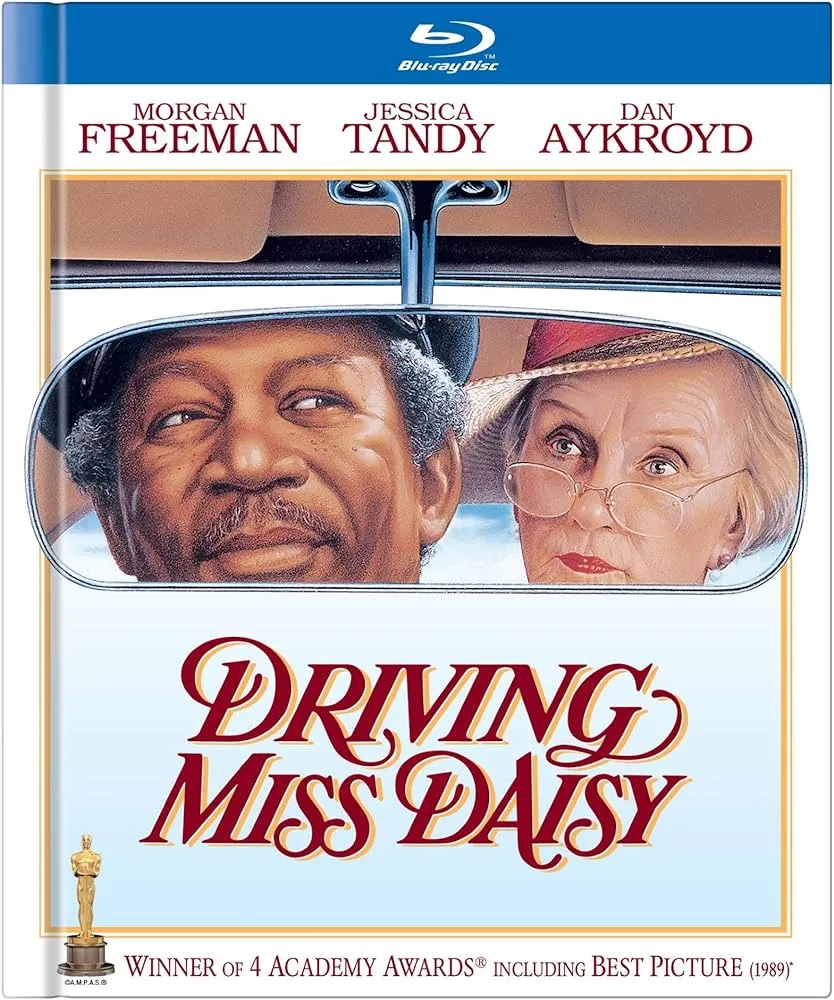
Driving Miss Daisy is a 1989 American comedy-drama film directed by Bruce Beresford and written by Alfred Uhry, based on his 1987 play of the same name. The film stars Jessica Tandy, Morgan Freeman, and Dan Aykroyd. Freeman reprised his role from the original Off-Broadway production.
The story defines Daisy and her point of view through a network of relationships and emotions by focusing on her home life, synagogue, friends, family, fears, and concerns over a twenty-five-year period. The film won four Academy Awards, including Best Picture, Best Actress (for Tandy), Best Makeup, and Best Adapted Screenpla).
Plot
Driving Miss Daisy is a 1989 American comedy-drama film that tells the story of an elderly Jewish widow named Daisy Werthan, who lives in Atlanta and can no longer drive. Her son hires a black man named Hoke Colburn to be her driver, which in the 1950s meant a black man.
Daisy initially dislikes Hoke, but over time, their relationship develops gradually over many years. The story defines Daisy and her point of view through a network of relationships and emotions by focusing on her home life, synagogue, friends, family, fears, and concerns over a twenty-five-year period.
Cast
- Morgan Freeman as Hoke Colburn
- Jessica Tandy as Daisy Werthan
- Dan Aykroyd as Boolie Werthan
- Patti LuPone as Florine Werthan
- Esther Rolle as Idella
- Jo Ann Havrilla as Miss McClatchey
- William Hall Jr. as Oscar
- Alvin M. Sugarman as Dr. Weil
- Clarice F. Geigerman as Nonie
- Muriel Moore as Miriam
- Sylvia Kaler as Beulah
- Carolyn Gold as Neighbor Lady
- Crystal Fox as Katie Bell
- Bob Hannah as Red Mitchell
- Ray McKinnon as Trooper #1
- Ashley Josey as Trooper #2
- Fred Faser as Slick
- Indra A. Thomas as Insurance Agent
- D. Taylor Loeb as Girl at Temple
- Martin Luther King Jr. as Self (voice) (archive footage) (uncredited)
Director: Bruce Beresford
Writer: Alfred Uhry
Box Office Gross: $145,793,296
Distributor: Warner Bros. Pictures
Release Date (Theaters): Dec 13, 1989
Release Date (Streaming): Oct 3, 2008
Themes & Reception
The play and film Driving Miss Daisy explore themes of friendship, race, and human dignity. The story delves into the complex relationship between an elderly Jewish woman, Daisy Werthan, and her African-American driver, Hoke Colburn, against the backdrop of the American South during a period of significant social change. The critical reception of the film has been mixed, with some praising it as a touching tribute to friendship and human dignity, while others have had more critical views.
Challenges Faced
The production of Driving Miss Daisy faced the challenge of effectively portraying the evolving relationship between the two main characters over a 25-year period, as well as the need to authentically depict the historical and social context of the American South during that time. Additionally, the film had to navigate the sensitive themes of race and prejudice in a way that was both respectful and thought-provoking.
Settings
The story of Driving Miss Daisy is set in Atlanta, spanning from 1948 to 1973, a period that includes the civil rights movement. The play and film explore the contrast between southern and Jewish cultures, as well as the evolving social and technological landscape of the time. The settings include Daisy's home, her synagogue, and the various places that she and Hoke visit during their drives together.
Visual Styles & Techniques
The film Driving Miss Daisy employs visual styles and techniques that capture the period and the evolving relationship between the two main characters. The use of cinematography and set design helps to depict the historical setting and the contrast between the characters' backgrounds. The film's visual style also conveys the emotional depth of the story and the characters' journey over time.
Trivia & Fun Facts
- The story of Daisy and Hoke was based on Alfred Uhry's own grandmother, Lena G. Fox, and her chauffeur, Will Coleman.
- Jessica Tandy, who portrayed Daisy, won the Best Actress Oscar for her role, making her the oldest winner of that category at the time, at the age of 80.
- Hans Zimmer's score for the film was done entirely with synthesizers, which he played himself. No orchestra was used.
- Real-life descendants of the person Hoke Colburn was based on appeared in the film.
- The film was based on a true story, and the setting included a real $2 million Georgian house in Atlanta.
